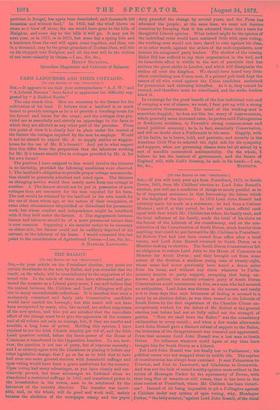FARM LABOURERS AND THEIR COTTAGES.
[TO THE EDITOR OF THE " SPECTATOR."]
Sur,—It appears to me that your correspondents "A. J. W." and "A Liberal Baronet" have failed to appreciate the difficulty sug- gested by "A Radical Squire."
The case stands thus. Men are necessary to the farmer for the cultivation of his land. It follows that a landlord is as much bound to provide cottages as he is to provide a dwelling-house for the farmer and barns for the crops; and the cottages thus pro- vided are as essentially and strictly an appendage to the farm to which they are allotted as any other part of the premises. From this point of view it is clearly fair to place under the control of the farmer the cottages required by the men he employs. Would it not be absurd to expect Mr. A. to supply stables or waggon- house for the use of Mr. B.'s tenant ? And yet in what respect does this differ from the proposition that the labourers working for Mr. B.'s tenant should live in cottages provided by Mr. A. for his own farms?
The position I have assigned to him would involve the labourer in no hardship, provided the following conditions were observed. 1. The landlord's obligation to provide proper cottage accommoda- tion should be generally admitted and acted upon. The labourer on changing service would then merely move from one cottage to another. 2. The farmer should not be put in possession of more cottages than are necessary for the men required for his farm. The rest would be retained by the landlord in his own hands for the use of those whom age, or the nature of their occupation, or some other circumstance disqualified or disinclined for permanent work, but whose comfort and independence might be interfered with if they held under the farmer. 3. The engagement between farmer and labourer should be of a more permanent nature than is now common. Supposing a six-months' notice to be necessary on either side, the farmer could not be suddenly deprived of his servant, or the labourer of his home. I would commend this last point to the consideration of Agricultural Unions.—I am, Sir, &c., A RADICAL LANDLORD.


































 Previous page
Previous page